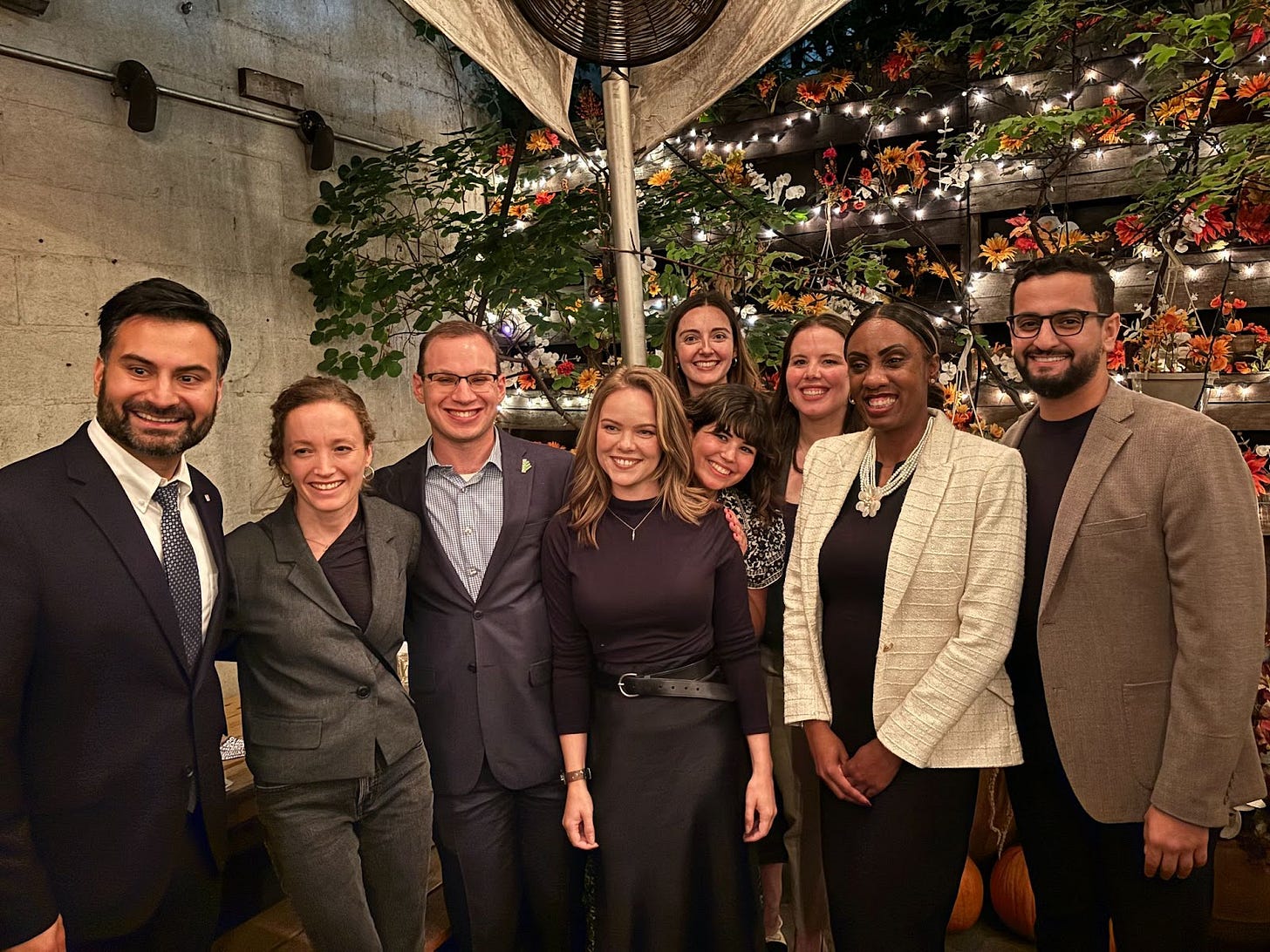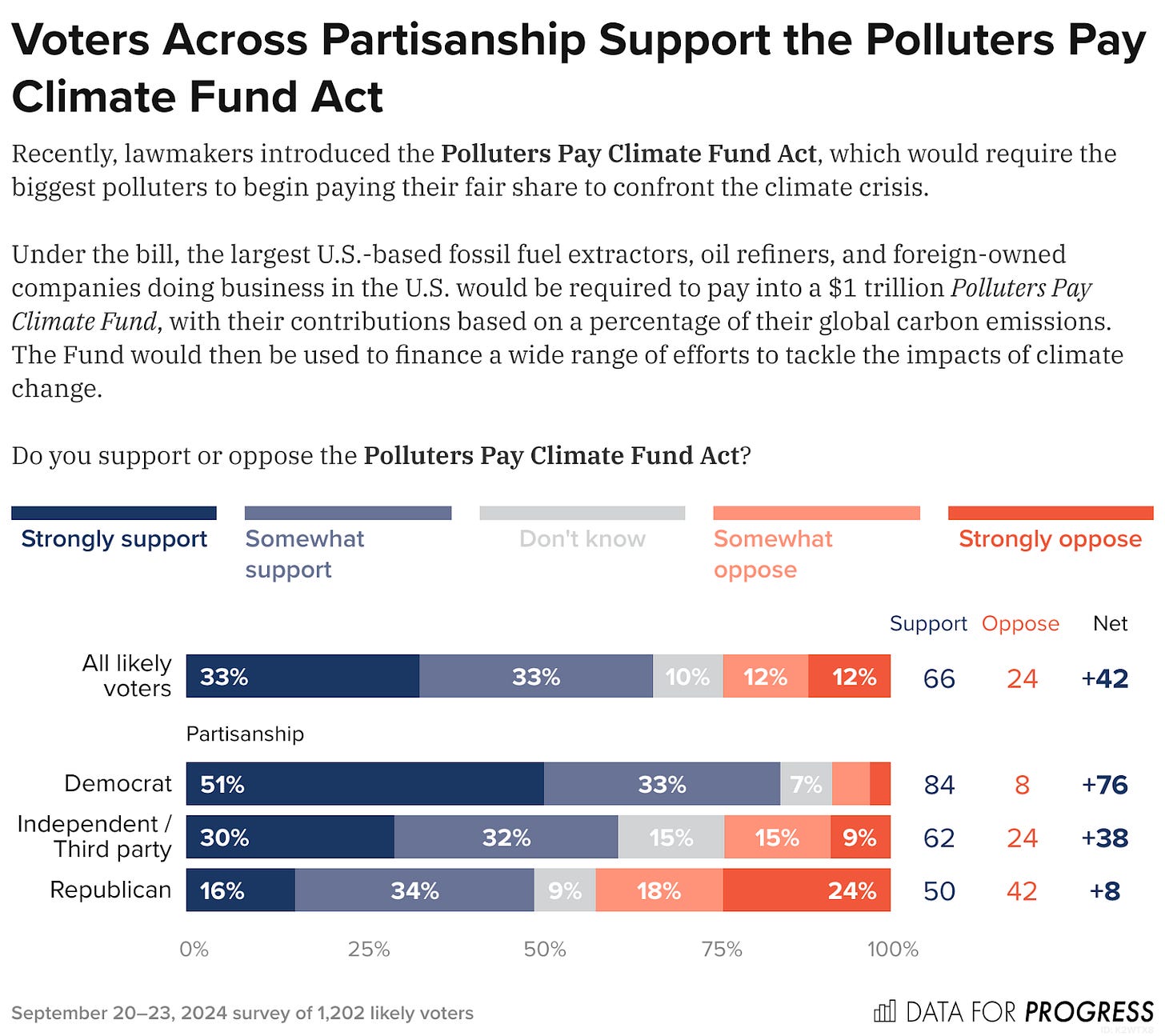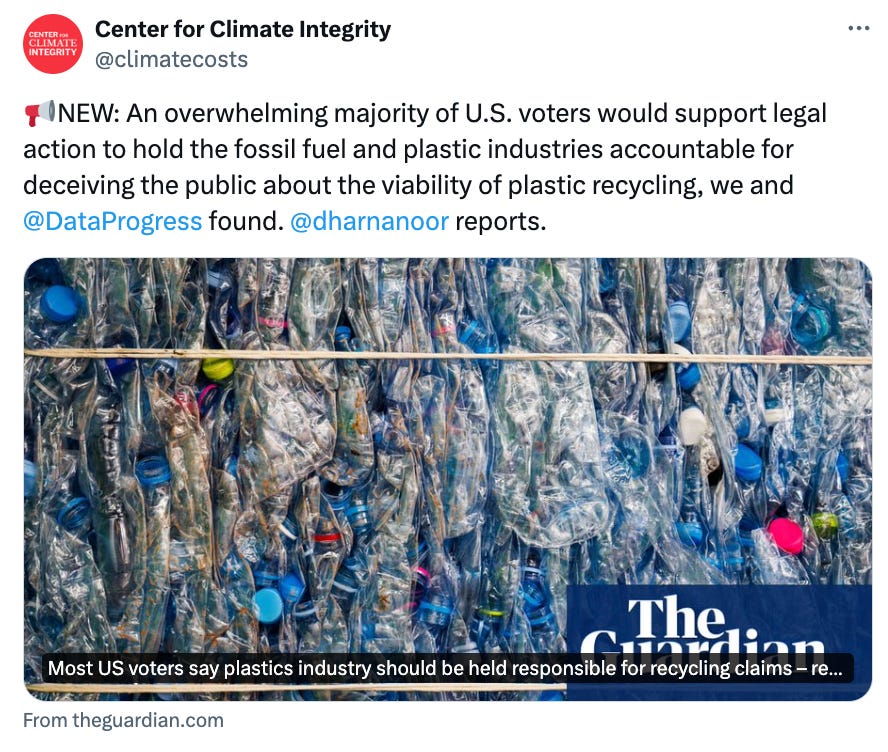Plastics Recycling Is a Fraud, and, Yes, You Should Blame Big Oil and The Plastics Industry
Welcome back to Data for Climate Progress — your one-stop shop for all things climate at Data for Progress.
Welcome back to Data for Climate Progress — your one-stop shop for all things climate at Data for Progress. Catch us here every month for our latest climate polling, juicy insights, and can’t-miss reading lists.
As always, we’d love to hear from you — drop us (Grace Adcox and Catherine Fraser) a line at gracea@dataforprogress.org and catherine@dataforprogress.org. Forwarded this email? You can subscribe below.
Meet Eva, DFP’s Fall Climate Intern!
Hi! My name is Eva Brungard (she/her), and September marked the start of my internship with the Data for Progress Climate and Energy Program. I am a Master of Public Policy candidate at Duke University, where I am concentrating on energy and environmental policy. I graduated from Indiana University with my bachelor’s degree in policy analysis in May 2023.
I got my start in the climate and energy space as an undergraduate research assistant at Indiana working on electric vehicle policy. Before joining DFP, I had various policy-related internships in the clean energy and transportation spaces, including at the Renewable Energy Group, Zero Emission Transportation Association, Tesla, NHTSA, and FERC. I am passionate about advocating for the energy transition while ensuring everyone experiences the economic, environmental, and social benefits.
This fall at Data for Progress, my focus will largely be on electric transmission and the potential for community benefits agreements (CBAs) to ease the right of way for these projects. This will involve researching and interviewing stakeholders for case studies of other projects using CBAs. I have done quite a bit of research into transmission in my academic and professional career, and I am excited to continue to move the needle forward with DFP. In addition, I will be leading my own public opinion research project – please feel free to reach out if you have any ideas!
If interested in chatting about electric vehicles, transmission, grad school, or anything else, please feel free to reach out at eva@dataforprogress.org
DFP @ NYC Climate Week
Thank you to everyone who joined us for Data for Progress’ NYC Climate Week happy hour, Progress No Matter What: Continued Climate Action In The States, hosted with World Resources Institute, Climate Cabinet, Evergreen Collaborative, and the National Caucus of Environmental Legislators. We had an amazing show of support throughout the evening with partners both old and new, and are so grateful to our many wonderful speakers pictured below, along with former NY DEC Commissioner Basil Seggos, who kicked off the event.

DFP’s Executive Director Danielle Deiseroth and Senior Climate Strategist Grace Adcox spent the week attending engaging panels and events, connecting with partners, and getting excited about electrification and decarbonization efforts in the broader climate movement. We’re looking forward to continuing the momentum post-Climate Week with new public opinion research projects and collaborations!
Young People Are ACC-tually Excited About the Green Workforce and Public Service Opportunities to Address Climate Change
We know that young people care about the climate crisis as we experienced yet another summer of intense heat and high-profile extreme weather events, but how exactly are those concerns impacting their career aspirations? Data for Progress and our partners at Service Year Alliance wanted to examine this very question, so over the summer we ran a national survey of adults ages 18-26 and hosted three focus groups to ask young adults about the green workforce and the American Climate Corps (ACC). We find that although young people may have limited information around the ACC and green jobs at the moment, when they learn more about these topics they are incredibly excited about the prospect of earning a good wage, gaining on-the-job work experience, connecting with a network of green professionals, and building community together. Read the full report here.
Latino Voters Want the Next President to Address the Costs of Climate Change and Extreme Weather … and We All Know There’s Only One Candidate Who Will
With Climate Power En Acción, Data for Progress surveyed Latino voters, including a pooled oversample of respondents in the key battleground states of Arizona, Georgia, Nevada, and Pennsylvania. Latino voters report facing the pocketbook pinch of extreme weather already, and we find that 65% agree with a statement saying the U.S. needs a president committed to addressing and prioritizing climate change and extreme weather within their policy agenda, including 53% of Latino voters in battleground states. Furthermore, 71% of Latino voters, including 64% of those in major swing states, agree that the next president should take action to make industries they view as most responsible for climate change and worsening extreme weather — the fossil fuel industry and big companies more generally — pay for damages they’ve caused to communities across the country. Read the full brief here.
Two Years Later and Voters Still Love the IRA
Just over two years after its enactment, the Inflation Reduction Act (IRA) remains widely popular with voters, with 71% of voters — including 89% of Democrats, 72% of Independents, and 52% of Republicans — saying they support the law. We also find that the most popular climate provision of the IRA tested is the bill’s standards that ensure businesses receiving government clean energy tax credits pay their workers a fair wage and make their goods in America (79% support), followed by grants for air pollution reduction (76% support). Read the full brief from DFP’s communications intern, William Diep, here.
Voters Seek Justice: The Fraud of Plastic Recycling and Support for Legal Action Against Industry
By Eva Brungard
For those familiar with the Great Pacific Garbage Patch, a gyre of plastic in the North Pacific twice the size of Texas, this news likely comes as no surprise: Very little plastic in the U.S. is actually recycled. Research by the Center for Climate Integrity uncovers how the plastics and fossil fuel industries have promoted fraudulent marketing and public education campaigns to intentionally mislead the public about the promise of plastics recycling.
For more than 60 years, petrochemical companies have used the false promise of recycling to justify a dramatic increase in plastic production, despite knowing that plastics recycling at scale is neither technically nor economically viable. Recycling plastic costs the same — if not more — than the original plastic material is worth. Globally, a small fraction of plastics are recycled, with more than 90% of plastics ending up in landfills, being incinerated, or persisting in our environment. And in the U.S., only 5% of plastics are recycled. Despite the petrochemical and plastics industry’s claims, clearly recycling is not a silver bullet for our plastics problem.
This month, the Center for Climate Integrity and Data for Progress released a survey of 1,231 likely voters in the U.S. diving into perceptions of plastics and plastic recycling, and assessing reactions to learning about the plastics and fossil fuel industries’ deception. After reading a brief description of potential legal action against the plastics and fossil fuel industries, voters across party lines express strong support for litigation against these industries over their role in deceiving the public about the viability of plastic recycling, including 66% of Independents and 54% of Republicans. Black voters (81% total support), voters under 45 (78%), and Latino voters (76%) report the greatest support for this proposed litigation.
Respondents were then asked to guess the percentage of plastic recycled in the United States. On average, voters guess that just under 45% of U.S. plastics are recycled. In reality, this number is far lower: around 5%.
The data is clear: Voters view these practices as deceptive and believe these industries bear the greatest responsibility to address the plastic waste crisis. As such, voters support litigation against the plastics and fossil fuel industries to hold them accountable for their role in deceiving the public about the viability of plastic recycling.
Read our full brief and survey results on the deception of plastics recycling here.
Voters Say It’s Time to Make Polluters Pay
By Kevin Hanley and Grace Adcox
The push to make polluters pay is ramping up, as lawmakers recently proposed the Polluters Pay Climate Fund Act. In light of this, we surveyed 1,202 likely voters to gauge support for the bill, which would require the largest U.S.-based fossil fuel companies to pay into a fund to finance a wide range of efforts to tackle the impacts of climate change.
Consistent with results from a December 2023 poll fielded in conjunction with Fossil Free Media, we find that two-thirds of likely voters support a bill to make polluters pay to confront the climate crisis, including half of Republican voters (50%). Black (71%) and Latino (79%) voters show stronger support than voters overall.
Other questions in the survey reveal that, compared with previous research, similar numbers of voters believe that climate change is mostly the result of human activity rather than natural changes in the climate cycle (60%). In addition, a plurality of voters (48%) believe that private corporations have the most responsibility for causing or accelerating climate change in the U.S.
As the United States deals with the massive costs of fossil-fueled climate change, we find wide support for the Polluters Pay Climate Fund Act.


















